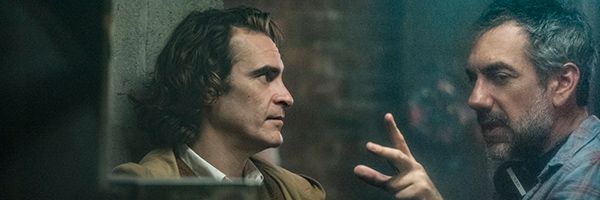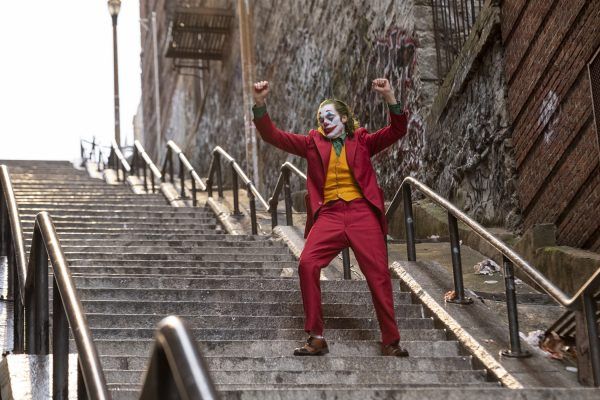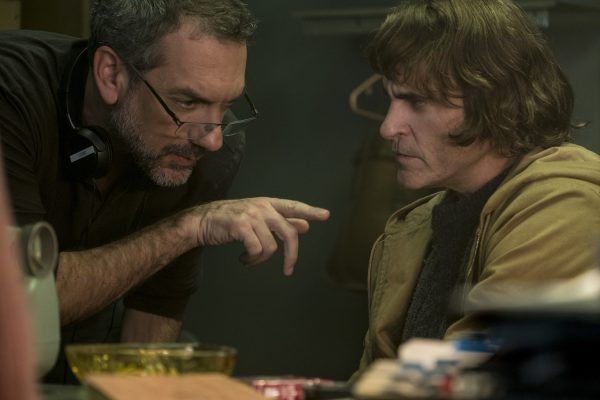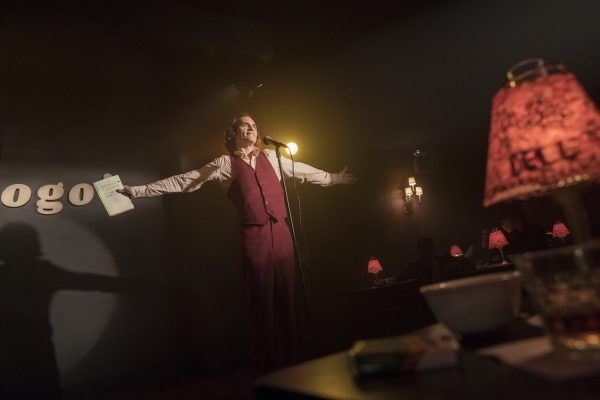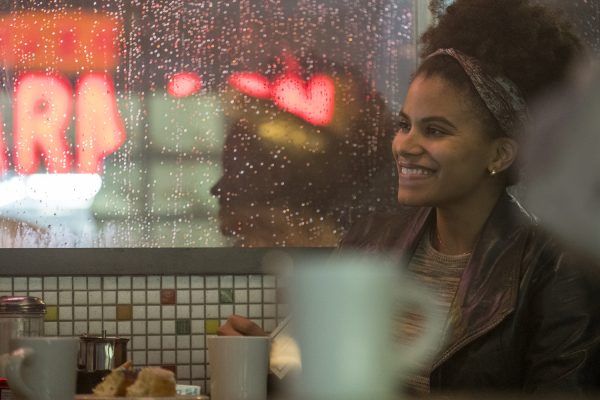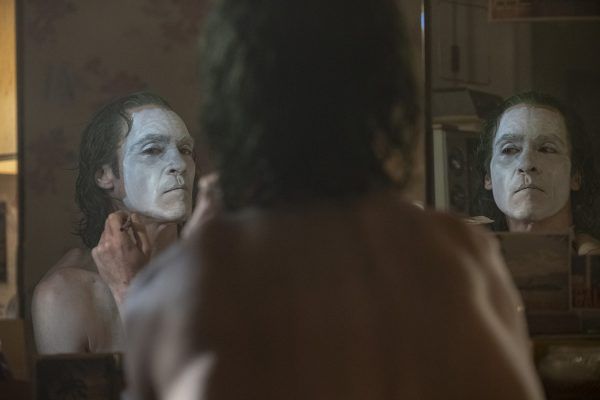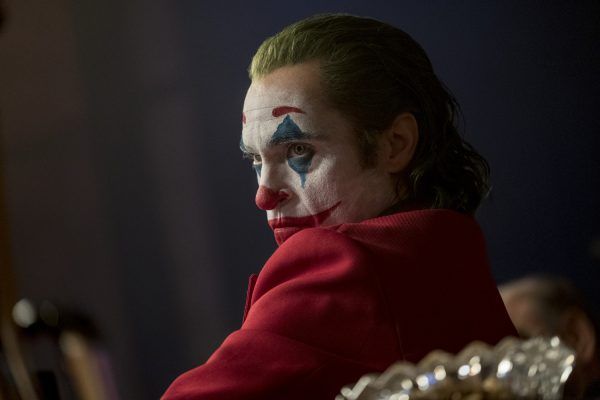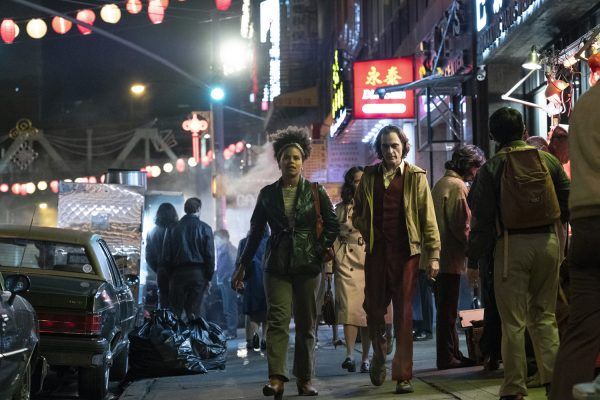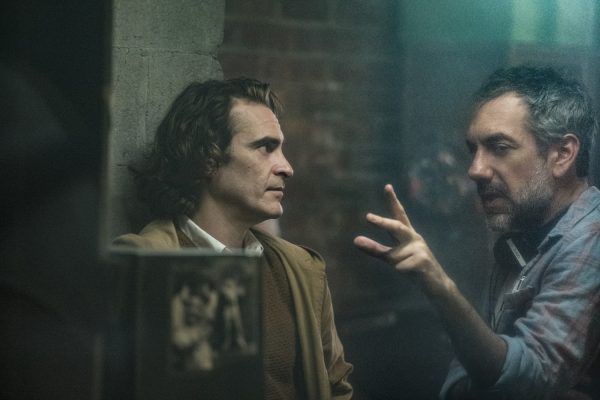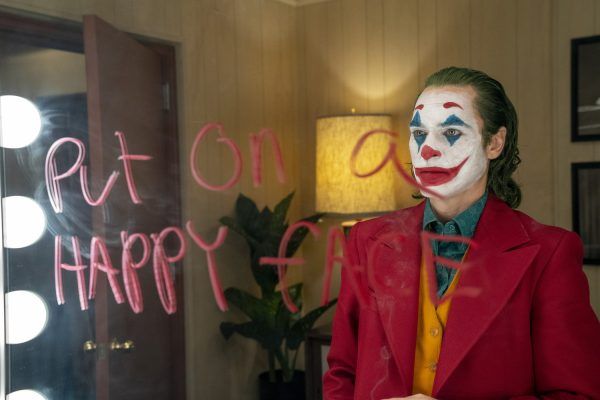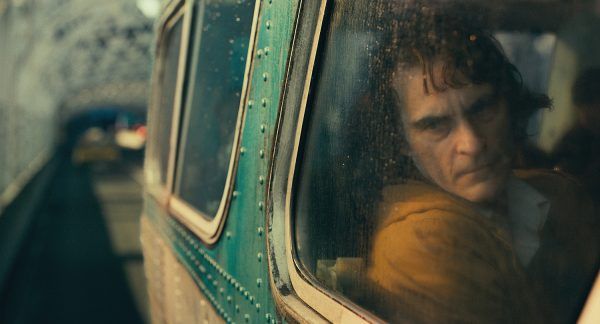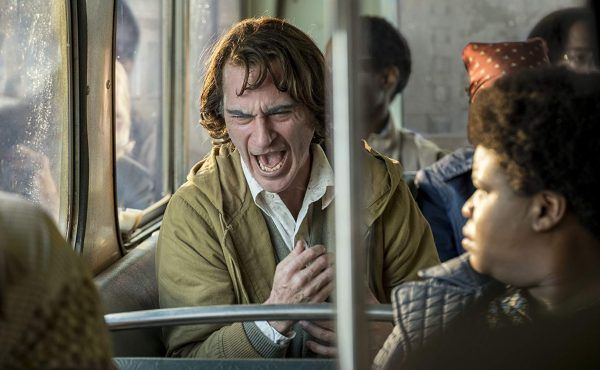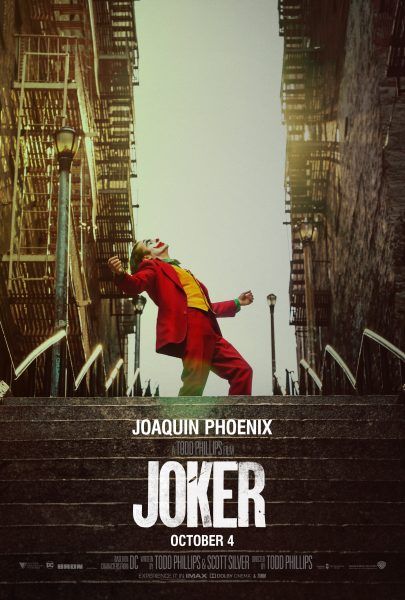Warning: If you want to be spoiler-free going into Joker, you might want to read this interview after seeing the movie. No major spoilers are revealed but a few minor plot points are discussed.
If you’re going into Todd Phillips’ Joker movie expecting to see a number of costumed superheroes cracking wise between massive action set pieces, you need to adjust your expectations. That’s because Phillips has crafted an intimate, standalone character study that’s extremely influenced by another era of filmmaking, and it stands in contrast to the other comic book adaptations that are common nowadays. From the way the opening credits play to the final frames of the movie, Phillips has transported the colorful comic book movie to the dirty, gritty streets of the late 1970s with fantastic results. Trust me, you have never seen a comic book movie like Joker and I’m not sure we will ever get one like this again.
As almost everyone reading this article knows, Joker stars Joaquin Phoenix as Arthur Fleck, a clown-for-hire by day and a wannabe stand-up comic at night. Unfortunately, Arthur never seems to catch a break and as things start to build up in his life, he starts to make decisions that will impact everyone around him. Joker also stars Zazie Beetz, Robert De Niro, Marc Maron, Shea Whigham, Frances Conroy, Bill Camp, Brian Tyree Henry and Glenn Fleshler.
After seeing the film in Los Angeles, I got to participate in a Q&A with Todd Phillips and Joaquin Phoenix. They talked about why they wanted to make a character study, the various reasons they decided to place the film in the early 80s, why Phoenix wanted to get the laugh right before stepping on set, how the film has a few different laughs by Arthur, their reasons for having the movie be grounded in reality as much as possible, why they wanted to make a Joker movie instead of a straight-up character piece, how Phoenix never actually told Phillips he was going to do the movie during prep, the films that are homaged in Joker, and so much more.
For more on Joker, you can watch our video review or click here for all our previous coverage.
As the group of journalists attending the Q&A put down their recorders at the front of the theater, Phillips started talking:
TODD PHILLIPS: I find it difficult to talk immediately after a lot of films, this film in particular for me, and I found that as we've shown it to people, even when I just bring someone to the editing room and show it to a friend, a filmmaker friend, whoever, and then it's over and then they need time. A little bit to sort of process it, honestly, in a way. But we don't have that luxury, but we can answer stuff if you have questions. We can talk about things. Go ahead.
Question: Just going on what you're saying, was that your goal from the beginning when you were thinking of pitching this idea?
PHILLIPS: The goal that you can't talk about it after?
That it has a sort of profound impact.
PHILLIPS: Yeah. I mean, a little bit. I mean, not a little bit, yeah, for sure. I always enjoyed movies that are difficult to speak about right after, and you go, "You know what? I want to process this a little bit." I always find those to be particularly rewarding in a way. It's not like that was a specific goal, but it's something that I always enjoy about movies, where you can't necessarily distill it down into a one-line thing really simply. So, yeah, I suppose it was somewhat of a goal.
The physicality of Arthur's character is fascinating, and I'm curious how you developed that?
JOAQUIN PHOENIX: Well, some of the dancing, there was a sequence where he was the clown and then there was the dance on the steps. So, I worked with this choreographer for that, but then something after working with him, Michael Arnold was his name, I just started watching a lot of videos of people dancing, movement-
PHILLIPS: I think one of the earliest things we spoke about was that Arthur had music in him. You know, like it just existed in him. Some people that you might know personally have that feeling, and I always thought that about Arthur, but it was sort of kept in and trapped. And there was something about that evolving, but like the scene in the bathroom, which I think is what you're getting to, where he just starts dancing, that's not in the script, that's not in the thing, that's something that kind of evolved and like, oh this is a moment where can sort of show that it's kind of fighting to get out. You know? But I love the dancing in the movie. I think we should have more of it.
PHOENIX: That's a pretty good answer. Was the dancing always there?
PHILLIPS: Well, the only dancing in the script was the dancing obviously as a clown in the beginning, which isn't really much of a dance. It's a performance, but the dancing on the stairs was there. Other than that, we didn't do it, but when we started talking about Arthur, we started talking about music and having music in him and that kind of thing.
PHOENIX: Good to know.
I was kind of struck by the period setting, the fact it was specifically, I guess, 1981 and I'm in my mid-forties and a lot of the stuff I kind of forgot about growing up, about how kind of ugly a period of time it was in the late 70s to the mid-80s. If you could talk a little bit about that kind of choice of that- I had even forgotten about Zora the Gay Blade.
PHILLIPS: It came out in 81.
Even like the Bernie Getz kind of thing, it sparks the whole thing.
PHILLIPS: Well, for us, in the movie, we never say it's 1981, but we say it's late 70s or early 80s, mainly because we don't want people to be like "Wow, that car wasn't out in 1981." So late 70s or early 80s, but the time for me, the reason we set it there, was a lot of reasons. One reason was to separate it, quite frankly, from the DC Universe. When we pitched it to Warner Brothers and handed the script in to sort of make it clear, this isn't fucking with anything you have going on. This is like a separate universe. So much so, it takes place in the past before everything else. Another reason is because tonally, the movie is very much a character study that—I'm a little older than you, but same as movies we grew up on and loved, and you go, "God, those movies don't get made as much anymore." They get made, these character studies, but you know. The Social Network is a great one. There Will Be Blood is probably the best character study in the last twenty years. But in the 70s and 80s, they were much more frequent, so in a way, it was also just an homage to that time where making a movie that feels like that, then why not set it there? It was not some really great thing, it was just a few reasons. And part of the reason that every filmmaker likes to do things, period, is so you don’t have to deal with fucking technology in movies, because it's so frustrating. Like "Oh, if they have a cell phone that gets solved." So there's a bunch of reasons, but there's something else. I like the handmade feel of those movies back then. And we tried to kind of inject that. Being that we were going basically no CGI, which doesn't mean none, there's obviously some world building we've done, but there's some real handmade quality to those films in the late 70s and 80s that I just always loved, I'm sure.
I wanted to ask Joaquin, just as a viewer watching the movie, it looked like such a transformative performance. One where I, just as a viewer, I'm assuming you went to some very dark place as to sort of capture the essence of this character, of Arthur, and I wanted to know how deep did you get? How did you get yourself out of that?
PHOENIX: Mostly, I’m going to disappoint you. I don't think I did. I think we had a good time. Honestly. I feel like I'm going to seem like an actor that's not really committed and you're like, "Oh, he didn't really do anything. He had a good time. He shouldn't have had a good time."
PHILLIPS: We did laugh a lot.
PHOENIX: And that's the thing, I saw someone in the elevator and they're like, "This is really fucking intense." I was like, "We laughed like every day." And they were like, "There's nothing really to laugh at." Oh, we kind of are fucked up. We literally were laughing every day going, "This is ridiculous!" So, honestly, I love those stories of actors. I kind of do wish that I was that way, because it sounds so cool, but I didn't have that experience.
PHILLIPS: No, but I mean, you also prepare a lot. More than you probably want to let on.
PHOENIX: But whatever! But that's what you fucking do! What do you mean? It's what you do, it's a regular job. It's what you do for your work.
PHILLIPS: Right. I'm just saying, you didn't show up and just be like, "Oh, I can do this." We talked a lot about it.
PHOENIX: Listen, I was telling my sister the other day, we arrived two hours before our call, right? Be in the fucking chair, working, and then we'd go home, call each other. Well, we'd text for a couple hours, then get frustrated with the texting, and just fucking call. I'd call you, you wouldn't answer a few times. I kept calling back and finally you were like, "What?" Right?
PHILLIPS: It's true.
PHOENIX: So there was that.
PHILLIPS: That was a great process for us.
PHOENIX: It was. It was inspiring. And so whatever you put into it, it kind of gave you so much back, right?
How'd you find the laugh?
PHOENIX: The laugh. Which one?
PHILLIPS: To me, there's like three different laughs in the movie.
I guess whatever you would deem the most iconic, fully formed laugh.
PHOENIX: Well, really, do you remember that I auditioned myself? I had you come over to audition the laugh.
PHILLIPS: That's right.
PHOENIX: Because I didn't think I could do it. And you showed me some videos, right?
PHILLIPS: That's right.
PHOENIX: So you showed me some videos of some laughs and I thought, "That's really good." In the script, it described the laugh being almost painful. I thought it was a really interesting way to describe laughter. And you came into my house, and I was really uncomfortable. I sat there five minutes trying to work it up, and finally you said, "You don't have to do this."
PHILLIPS: You already have the part, yeah.
PHOENIX: And I said, "No, I have to do this. Because if I don't do this now, if I can't force myself to find it now, then forever I'm going to fucking puss out." So I did it.
PHILLIPS: And for him to summon it on the day of the shooting was always different and sometimes he would need time to do it, honestly. I'm talking about the affliction laugh, you know that was to me, probably, the hardest one to do. There's the laugh where he's fake laughing to be one of the guys or put in the comedy club. The affliction laugh, I think, was probably hard to muster up, so there were times on set where it would be a little bit…so I would throw out a private joke to him that would try to make you laugh about somebody on the crew or something.
PHOENIX: I never made fun of people on the crew.
I'm curious about for the writing and for the performance aspect of it, there's stuff in there that as far as having head trauma and the implication that—I have a family member that literally has a lot of the affliction that's in this, from head trauma as a kid. That wasn't coincidence?
PHILLIPS: No, we researched it, and I studied, quite frankly, that laugh and people it's afflicted in different ways. Some people cry from this, and some people laugh. And it’s always at the wrong moment, and it's really painful. And what we discovered is, it happens from head trauma as a young person or even older. And it happens from MS, which we didn't necessarily want to give Joker/Arthur MS. So we went with this head trauma thing. The movie in every way tries to be grounded in reality as much as possible. It still has a foot in the comic book world, for sure, but we just kept thinking, "Let's put everything through a realistic lens." Like, why does he have a white face? Well, we're going to drop him in acid. While it's amazing in the comic books, and Jack Nicholson and all that, it didn't feel very real that that would happen if you fell into a vat of acid. So let's come up with a realistic answer for everything, and that was one for the laugh. So yeah, we researched it. Does that make sense?
PHOENIX: It does, but even that, we don't know.
PHILLIPS: Right, we don't even know if he's putting it on.
PHOENIX: In some ways, as much as there was very thorough research, and answers for a lot of these things, whenever we got to a part where we felt like we were coming up with a definitive reason for anything, we backed away from it. We found a way to kind of circumnavigate it a little bit. Right? We just wanted it to be—
PHILLIPS: He hates logic.
There was a moment where he says something like, “you told me it was an affliction, that I had a condition, but I don't.”
PHILLIPS: Right. You say that's the real me, and that's an important part because oh wait, it isn't. But what is this?
PHOENIX: And I don't think we necessarily want to answer those things for ourselves or for anyone else. They're part of the joy of this movie, how the audience interacts with the film and what they think about the character.
PHILLIPS: I've had younger people watch the movie, and just go, "This is an awesome origin story of the Joker that I would have never thought of." And then we've had other people that are more seasoned watching movies that see references or see, "Oh, this is reflective of what's going on today." And blah blah blah. And it's just two as-valid responses. And so it’s always difficult, when you make a movie, to define it for people, because your job is to make the movie and let them sort of…
Is there any thought of how old Arthur is in the film?
PHILLIPS: You mean what his age is?
Yeah, what his age is. I know 30s was pushed around because…
PHILLIPS: No, we never really gave much thought to it. And you're saying the age discrepancy between him and Bruce?
That's what we're curious about.
PHILLIPS: I mean again, we have people who watch this movie who go, "Oh, I get it." And by the way, I'm not saying they're right, they go, "Oh, I get it, he's not the Joker, he's the inspiration for the Joker. He's somebody that inspired the Joker." And you go, "That's an interesting way of looking at it." And they go, "Why?" Well their age difference, and blah blah blah, and I go, "That's interesting.”
I assumed he's remembering the dates correctly. Maybe he's not.
PHOENIX: And there's that. So it's a lot of fun, hopefully.
Do both of your interpretations of the film line up?
PHOENIX: No.
Okay, so you have different…
PHILLIPS: No, we’re kidding. We don't really talk about it like that. When I showed it to him or when he read the script at first, we didn't necessarily have the conversation of "So what do you think this means?" I think we liked that there's a little bit of mystery to it. And then it's liberating for us making the movie. It isn't really a super defined thing. Joaquin tends to question things a lot, in a good way. And throw out logic.
PHOENIX: I'm like that in most movies and most characters, but here there was a real opportunity. Like I can do whatever the fuck I want.
You're making a movie about a lot of different things, right, it could be about mental illness or the haves and have nots, but the fact that the Joker is almost superfluous in the whole thing. But once you make it a Joker movie, you bring in all these different expectations in the comic book history. So can you talk about some of the positives and negatives of making a Joker movie instead of like a straight up character piece.
PHILLIPS: I just thought it was an interesting new approach to the comic book world, and it's funny because a lot of you guys have probably reprinted something I said in Empire where I was misquoted, and I'm not going to complain, I like the writer and he did a great piece, but actually we didn't take anything from the comic book world. It's actually not what I said. What I said was we didn't take anything from one particular comic, we kind of picked and chose what we liked from the kind of eighty-year canon of Joker and said "Oh, that's interesting." We kind of pulled a few things that we liked, but yes, could it have been called Arthur and just be about a clown? Maybe. I just thought there's a new way to tell a comic book movie, and maybe I'm wrong, but let's do it as a character study. But a big part of what interested me about it more than making a movie called Arthur was to deconstruct the comic book movie a little bit. That was part of what was exciting about it. For him, it might be different, because I know that you had a lot of reticence, being in a comic book movie and doing that kind of thing.
PHOENIX: Did I? I don't remember. Steve [Weintraub], you remember, we talked about it?
We did. You were debating—don't you remember talking about how everyone was asking you about Joker and you were being very evasive? It seemed to me like you weren't sure.
PHOENIX: I actually had already agreed to do it when we spoke. I lied to you. (audience laughs) In all fairness, Todd says a great thing where you say—
PHILLIPS: I refute that, because I don't know that he ever agreed to do the movie. One day he just showed up at a wardrobe fitting. Because every day I would go up to his house, we'd talk about the script, we'd audition the laugh, we would do all these meetings, and I'd go, "All right, so?" And he's like, "So what?" "Are you in?" And he's like, "Oh, it's not how I do this, you know, it's like a process for me." And I'd go, "What are you doing on Thursday?" He said, "I don't really work like that, it just kind of becomes a thing."
Can I actually ask just one quick question? So we spoke in June or July of last year, and from what I gathered, you were still debating—
PHILLIPS: No, no, if it was July, he had already been to a wardrobe fitting.
PHOENIX: But here's the thing, if it was July...because I got...
PHILLIPS: To New York in August. August 1st.
PHOENIX: Yeah I would have already been seriously dieting.
I don't remember when the date was. It was right before You Were Never Really Here came out. [Editor's note: The interview ran on Collider on April 10, 2018] I'm just curious, when did you actually decide, "I want to take on this role" and when did you find out? Because there must have been a day where it clicked in your brain, where you're like, "Okay, I'm going to do it!"
PHILLIPS: I found out at a wardrobe fitting. Mark Bridges called me, said, "Joaquin's here. You want to come down?"
PHOENIX: I don't remember.
PHILLIPS: It was never really like, "All right, let's do it."
PHOENIX: All right, we're doing this. It really was like, "Well, let's go, let's try on some stuff. And talk more about it.”
PHILLIPS: Let's keep exploring it and oh, let's put some makeup, and all of a sudden we're shooting. It was never like, shake your hand, I'm in. Which a lot of actors I've had that experience with.
PHOENIX: It's the decent thing to do.
PHILLIPS: He said to me at one point, he goes, "Uh." I go, "Come on, can't you just?" He goes, "Well, what do you want me to do?" I go, "At some point, I want you to say thank you, yes I'm in!" That never happened.
PHOENIX: Never, not even once we were done. I'm still debating whether I'm doing Venice.
So I watched King of Comedy last night for the first time, changed my life. So one thing I realized was the color patterns on the clothes kind of matched the backgrounds. I noticed you did that in this one too. Did you do that on purpose?
PHILLIPS: Obviously there's a nod to a few things in this movie. King of Comedy for me—you're way younger, I probably saw it when I was your age and it changed my life as well. I just love it so much. Obviously I went to De Niro, sent him the script, he understood the kind of reference, understood the flip of Rupert Pupkin to Jerry Langford. As far as the color scheme, it wasn't honestly something—in that movie, it’s a little bit more direct. In this, it's a little bit more random, but a lot of what we took... the curtains for example, is a little bit of a spin on Johnny Carson's curtains, but certainly there's a touch of King of Comedy in there, there's a touch of Network in there, there's a touch from me of Dog Day. There's a lot of movies all from that time, we were talking about earlier, that speak to that kind of, again going back to why did we set it back then. It’s just, to me, not that the movie's a love letter to those movies, but it's very much an homage to that.
PHOENIX: Wow. That is interesting. I wish I would have known that.
PHILLIPS: Yeah.
PHOENIX: You could have let me in on something. Now I get to learn all about this movie. Thank you.
Joaquin, what did you think? Have you watched it in full?
PHOENIX: Have I seen the movie?
PHILLIPS: Yeah.
PHOENIX: What do I say?
PHILLIPS: Is that a hard question to answer?
You started to answer.
PHILLIPS: He came over to my house and watched the movie. There are many cuts, the first cut to this movie is two hours and thirty-five minutes, he saw that. And right now it's two hours and two minutes, I think with credits. So you'd have to ask him.
PHOENIX: I know. And what's so hard?
PHILLIPS: It just sounds lame either way.
PHOENIX: No matter what you say, you're like...you sound like a conceited thing.
PHILLIPS: Right.
Joker opens in theaters October 4th.

